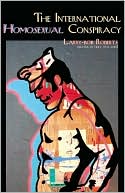 The International Homosexual Conspiracy
The International Homosexual Conspiracy
by Larry-bob Roberts
Manic D Press, 160 pages, $14.95
I MET Larry-bob Roberts once. We connected through the small press world: I had contributed to his long-running zine Holy Titclamps, and he listed my own self-published rag, Slumber, in Queer Zine Explosion, a sort of catalog with short reviews attached. He was coming north for a comedy event near where I lived, so we met up beforehand and chatted, attended the event, and afterwards, since I don’t have a car, he was kind enough to drop me off at home.
During the stand-up comedy, at least five people came up to say hi to Larry-bob. He always took time out to introduce his friends to me, explaining how he knew each of us to the other. Being nervous around new people, I immediately forgot everyone’s name and felt like a colossal ass, especially when, to a person, each of them used my name multiple times during even a brief exchange. The next day it occurred to me that what struck me as exotic behavior was in fact simple politeness. It changed the way I dealt with people from that moment forward.
I mention all this not only in the interest of full journalistic disclosure or for coolness points, but because interactions like the one described above are central to many of the pieces in The International Homosexual Conspiracy, a collection of 86 screeds on a wide range of topics. The book’s first two sections, “On Community” and “On Communication,” address our general unwillingness to engage strangers in conversation when we encounter them in real life, as opposed to the virtual world, where hours of chat-room time can accrue almost effortlessly. “While I have been sexually monogamous, I am socially promiscuous,” he writes, describing himself as “curator” of a social scene, and encouraging readers to forge similar connections of their own, basically by exchanging any resistance or shyness for the technique described above.
Many of the pieces are short and pointed, but some are hilariously barbed. In the section “On Homosexuality,” there’s a satiric piece in the voice of a gay real estate agent looking to gentrify the Mission for gay men—by evicting the lesbians and running off the homeless kids who are “trying to get a free lunch.” This follows the more straightforward “An Open Letter to the Castro,” which directly takes on the neighborhood’s conformity and exclusivity. “Is this a neighborhood or a strip mall?” he asks, noting the area’s lack of live performance venues and plethora of dance clubs offering the same soundtrack and flashing lights.
Roberts returns to the theme that he often feels like an outsider among gay men. Being a teetotaler in a scene that often runs on drugs and alcohol cuts off a certain percentage of potential acquaintances. Preferring obscure music to the heady thump of disco means more time spent hanging out with dykes than gay men. And being attracted to larger but clean-shaven men means even the average bear’s den isn’t open to him. He identifies with the lesbians he sees at punk shows or onstage performing the spoken word, and also with the FTM transsexual community. In the section “On Writing,” he refers to his work as “narrowcasting” in search of a larger audience.
If there’s a fault to be found with this collection, the expression “do the math” can be applied: here are 86 essays pressed into a mere 160 pages. That means the average piece is under two pages long, give or take a paragraph. (One essay let slip that many of these pieces were written and honed as live performance pieces, a medium where brevity is needed to avoid being yanked offstage with a cane.) While each piece is a fully realized creation, there are times when more would be better, if only to let such heady ideas breathe a bit on the page. In other cases, the choppy structure combines with sophisticated critique and commentary to lend the book much of its charm.
The International Homosexual Conspiracy is a testament to Larry-bob’s consistent growth as a writer. Always curious and never complacent, this collection may just attract that larger audience of readers who will find themselves challenged, examining their assumptions, and frequently laughing out loud.
________________________________________________________
Heather Seggel lives and works in Ukiah, CA, and remembers people’s names much better than she used to.





